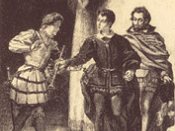Set in seventh century Denmark, "Hamlet", written by William Shakespeare, exposes the intricacies of the human mind through his presentation of characters. Shakespeare is able to further the dramatic situation of the play by providing foils to Hamlet in the extreme. Both Laertes and Ophelia mirror Hamlet but behave in opposite manners in reaction to Polonius' death. Meanwhile, Rosencrantz and Guildenstern are torn between loyalties just as Hamlet. The difference between Laertes, Ophelia, Rosencrantz and Guildenstern, and Hamlet is that the four supporting characters were more responsive and reacted quicker than Hamlet when making a decision. The play, Hamlet, is a revenge tragedy centered on corruption, betrayal, murder, and insanity. Shakespeare's presentation of characters adds to the dramatic irony of the play and likewise provides an explanation behind the motives of his/her behavior.
Through "Hamlet", Shakespeare is able to present a protagonist by which the audience can relate to.
Hamlet's soliloquies ultimately add to the dramatic irony of the play because the audience knows more than the other characters do. Shakespeare portrays Hamlet as an indecisive character. After his encounter with the Ghost, Hamlet vows to avenge his father's death. However, upon hearing the news of his father's murder, it is unclear as to whether Hamlet is truly insane or just playing the part. In contrast to his foils, Laertes and Ophelia, Hamlet seems to travel from one extreme to the other. He manages to raise the court's concerns, which is obvious when Hamlet's sanity is being discussed amongst the characters, though each character provides a different explanation for his madness. For example, "This is the very ecstasy of love, / Whose violent properties fordoes itself/ And leads the will to desperate undertakings/ ... /That does afflict our natures... (Polonius, Act II, Scene I, Lines 102-106)." Meanwhile, Claudius believes...


